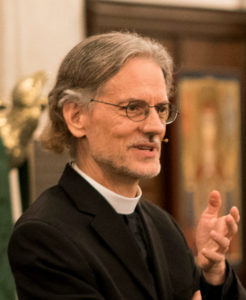Against Usefulness
Some things are good because they are useful in relation to something else, but other things are good simply in themselves. A friend of mine makes this point about children. You don’t have to give a reason for having children. Children—like all people—are ends and not means; their value is not in the good they provide for others but in their existence itself. My friend contrasts children with goats. You must have a reason to have a goat. It might be for milk or cheese, or maybe for keeping the grass down, but whatever it is, there is a purpose behind keeping a goat. (By the way, this is an argument for preserving the distinction between “children” and “kids.” Kids, being baby goats, need to be useful; children do not.)
It is, of course, only a rough distinction. You might be a person who finds joy in the weirdness of goats and thus you do like them for themselves. Animals are God’s creatures; and as Garrison Keillor says about cats, they show us you don’t have to be useful to be alive. Nonetheless, by and large, goats are creatures we keep around because they have some purpose beyond just being.
In education, too, we recognize certain objects of study that are useful, and others that are inherently good. Knowledge of auto mechanics, for example, keeps cars going. Cooking also is highly useful. To my mind, a supreme instance of useful knowledge is found in anesthetic surgery: The monument to ether in the Boston Public Garden celebrates the use of that gas—to deaden pain—not the gas in itself.
Other objects of study are clearly good in themselves, apart from any usefulness. One thinks of music, for instance. To learn to enjoy music is to appreciate it for its own sake. A fellow who carries on about how music relaxes his body and thus makes him better able to work hard the next day seems to have missed the point, no? We don’t enjoy music because it makes us work better.
Nonetheless, things we study for their usefulness can also be inherently good. To do work that helps others is a noble occupation—it is good in itself. We wouldn’t say we help others for the sake of our own subsequent enjoyment; rather we recognize that our satisfaction and our dignity are right there in the act of working itself. In his encyclical Laborem exercens, John Paul II says that the point of labor is not only what is produced (the objective end of the work) but what it does to the worker (the subjective reality).
I would concede that cooking is enjoyable in itself, or can be if one learns how to do it properly. On the other hand, I don’t know many single folks who enjoy cooking only for themselves. There is pleasure in mastering how to use heat and spice to make something that’s tasty, but cooking seems to call for the further end of a shared meal, the fellowship of a table.
So—back to children. My friend has many children, and he has remarked in public that he tells them they are good for nothing. He admits that other people may have children who are useful, who clean the house or mow the lawn or take care of each other. But he tells his own children that that isn’t the reason they are good: They are good just because they are children.
Moses told the people of Israel that God didn’t choose them because they were strong or virtuous or had other good qualities. On the contrary, God chose them when they were weak and good for nothing. To be God’s children, it seems to me, is to face the fact that while we may be useful for some things, in the end we are good for nothing we do but simply for who we are. Therein lies human dignity.
We who are committed to the defense of the dignity of human life must be clear. Human beings are not worth defending because they are useful, but because they exist.










